News & Updates
The Beauty of Nature Beyond the Visual: Luke McGraw’s Story

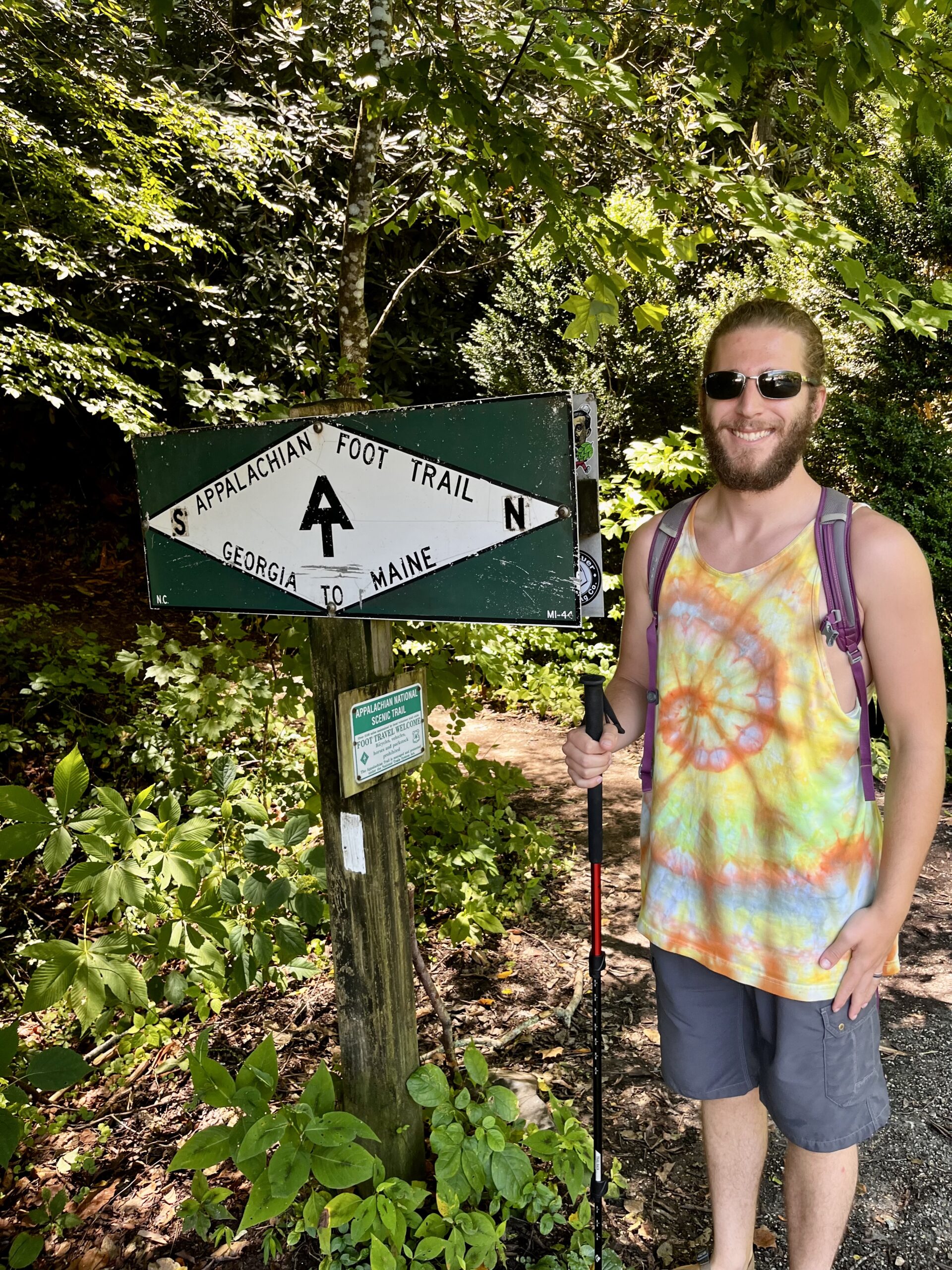
The outdoors is for everyone. Yet when nature is discussed it is often from a purely visual perspective, which may be understandable but is a misstep.
See, how we relate to and interact with the outdoors should be up to the individual. No one I’ve talked with has better illustrated this point than my teammate Luke McGraw, an avid outdoorsman.
I met Luke on my – and his – first day at Leave No Trace. Luke lives a Jack Keroauc-like life with his wife, Becca, as one of our Subaru/Leave No Trace traveling teams. Thanks to the happenstance of fate, we had the delight of on-boarding together.
The first question of our first day was pretty straightforward. “What is the main thing getting you outdoors?”
We went around the circle, many of the answers being exactly what you’d expect. Hiking, biking, and other active hobbies. I answered pretty honestly, too – I get outside specifically to be alone, to move a little slower than society would like us to.
A few turns later Luke answered, talking about how much he enjoys resting in nature, how important it is for him to be in one place and slowly take in surroundings. At this, I went to meet his eyes and give him the little head nod indicative of “I feel you.”
This was met with no response. Luke, it turns out, is blind.
When first asking him to partake in this interview series, I tiptoed around how to address this facet of his life. This, it turns out, is the very thing that I shouldn’t have been doing – Luke is blind, he’s well aware of that fact, let’s get on with it.
Sure thing, let’s do just that. Please read Luke’s story to better understand life in the outdoors as a blind individual, to hear what life on the road is like as a Subaru/Leave No Trace trainer, and about how we can be more accessible to all in the outdoors.
M: Since I had been beating around the bush in our exchange beforehand, I figure it’s best to not do so in the actual interview. So, Luke, if this is the only answer you get, what would you want the main takeaway from this interview to be for readers?
Luke: That’s a good question. In my and others’ experiences, there is a lot of pressure for those with a visual impairment to mirror our outdoor recreation similar to how people with vision would. There are expectations that I will want to recreate the same as people with vision, and that we’re after the same goals. That’s not just not the case.
My main objective here is for us to communicate that people genuinely will want to enjoy the outdoors differently, and that’s not a value judgment, it’s just a fact.
M: And could you talk further on the juxtaposition between the way outdoor recreation looks for others and the way it plays out for you?
Luke: Sure, I’ll start with my own family as a reference to the field as a whole. Both of my parents are ex-military and very outdoors-y and active, which is great. It got us outside all the time growing up.
They take hiking and time outside as something very active, very movement-oriented. My parents hike very quickly, they don’t really sit around.
I do hike, I enjoy hiking. But it’s much more of a taxing endeavor for me. I don’t really get to enjoy much of the scenery, it’s more of a “try not to trip for a couple miles” experience [laughs].
I don’t want to take anything away from that active experience. My dad’s encouragement of me to keep going, to not give in or give up, was hugely impactful. We actually competed in a 206 mile tandem bike race the year after I graduated high school – I think I really needed that kind of push as a kid to gain self-assurance and a sense of discipline.
More recently, though, as I’m doing more outdoor recreation on my own, with Becca, with friends, it’s changed quite a bit. Now there’s a lot more relaxing in the forest, sitting around and talking, swimming, and things that are not quite as movement-oriented.
It allows me to memorize a space, to learn my area. It allows me to move as much as I feel like, without the need to be going and navigating new terrain. I do enjoy more active outdoor pursuits like rock climbing, cycling and surfing, but the majority of the time I prefer to lay in a hammock.
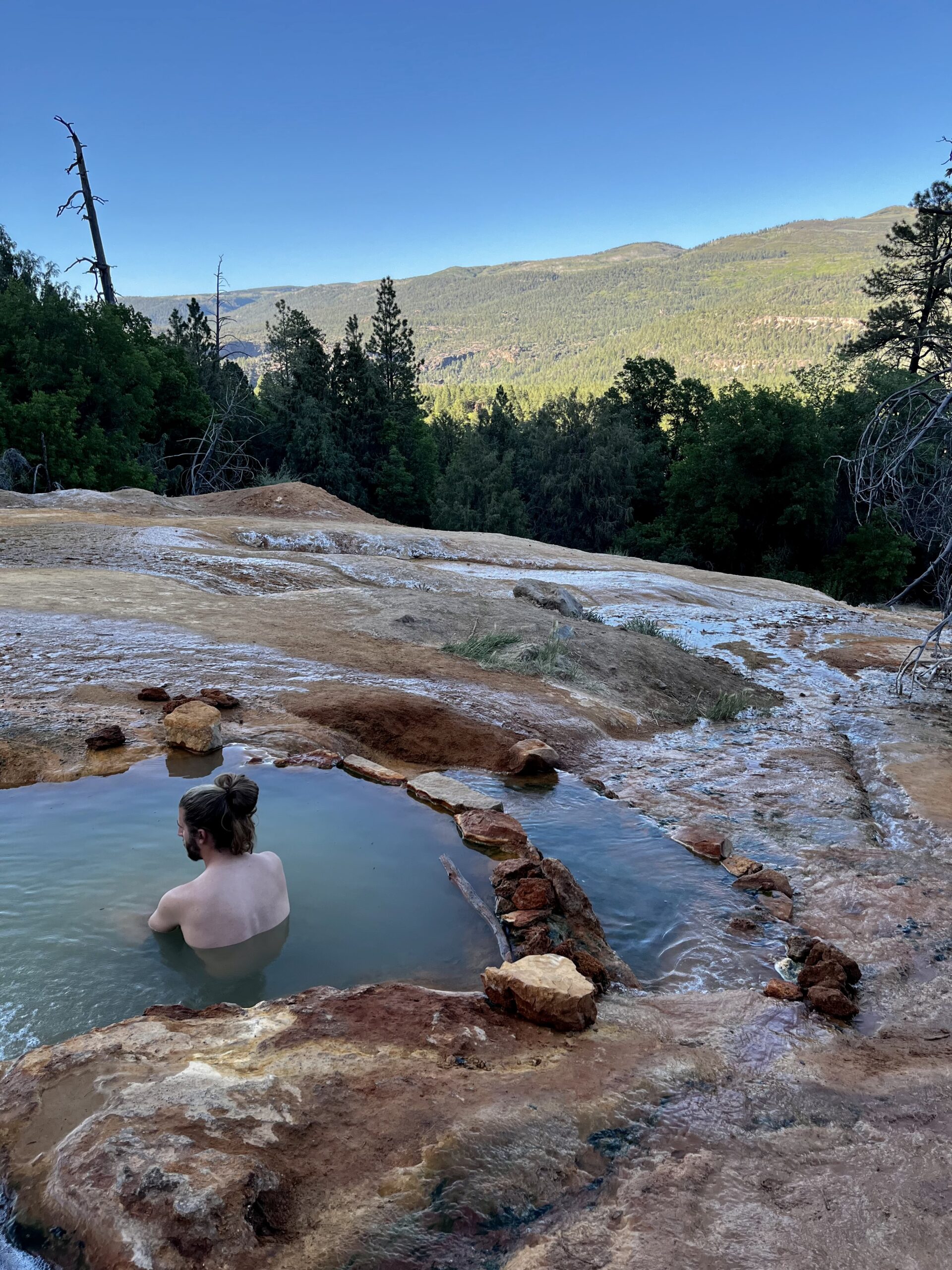
M: Okay, so for you now, outdoor activities are about being present, rather than in pursuit of a goal.
Luke: Yeah, it’s much more in the pursuit of rest, of peace, of enjoying nature and other people. Rather than getting to the end of a trail and back, or seeing a particular view.
M: So what does that inner monologue for you look like these days, when going from being an active sort to being someone more in pursuit of rest?
Luke: It’s a lot of listening to birds [laughs]. Sounds are really how I feel connected to the scene of nature. So we’ll sit by the lake, or the forest, listening to the leaves rustle with the winds. Just hearing that wind, smelling the trees, feeling the sun on my face. Those types of sensations are how I feel connected to nature. The experiential side of it moving, rather than me moving.
M: And I imagine it’s a lot easier to hone in on the experiential side when outside of a city.
Luke: Oh, yes. A lot of people don’t seem to realize this, but sounds are how I am able to feel oriented. When there’s loud motor sounds, or lots of people talking, I genuinely do not know where I am at times.
Gentle sounds of nature aren’t just something meditative for me, they actually orient me to locations far better. The cacophony of city and town noise makes it harder for me to feel comfortable.
M: I understand. Let’s expand and talk about visual impairment and outdoor recreation as a whole. How can the industry as a whole be more accessible to the visually impaired?
Luke: That’s a big question! I think a lot of the answer is going to be up to the individual. So it is and should be up to me – if I want to try something new, I need to come up with a way to do it. I don’t expect people to have solutions for me, but it is nice to have conversations in pursuit of them.
For example, yesterday I went rock-climbing. And that’s something I’ve done before, but I’ve never been that great at it – climbing is visual, figuring out where the next handhold is and planning your route. I’ve done it casually a few times, and had never really thought about this, but the guy belaying me yesterday mentioned how much easier it would be if I had someone at the bottom with a spotting scope.
And I was like, “hey, you’re actually right!” So now that is something that Becca and I are wanting to pursue. It is those kinds of small, creative solutions that are most helpful, but finding them can often act as the biggest barrier.
Where the ground can be gained is by having folks in the outdoor industry actively pulling in people with visual impairments or other disabilities, saying “hey, I don’t know how this is going to work, you don’t know how this is going to work, but let’s try it and talk about it.”
Those systems will be developed. I think it’s going to take people from the outdoor industry being intentional, and being okay with some awkward interactions. And it’s going to take visually impaired individuals being okay with asking for what they actually need.
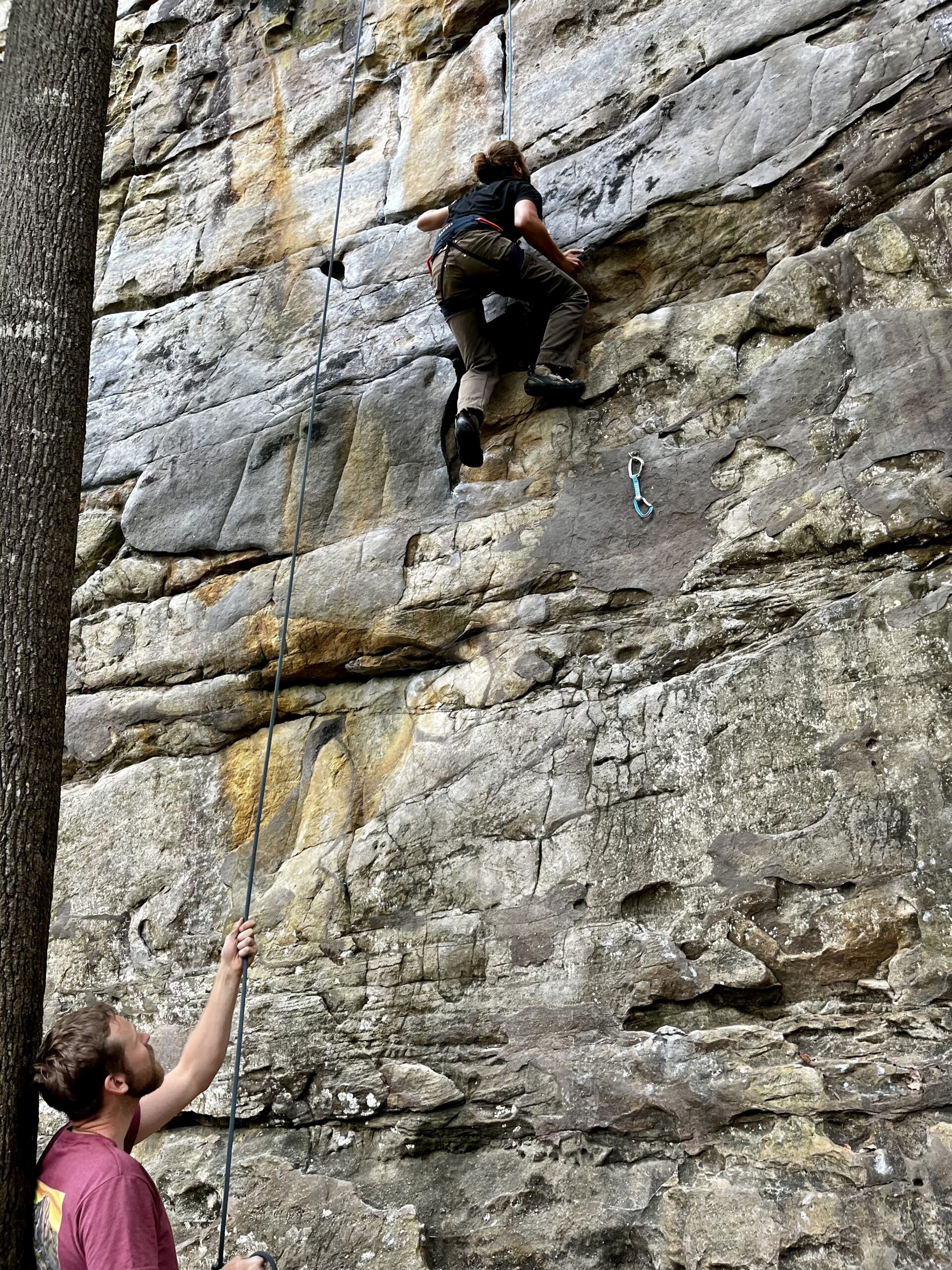
M: Along those lines, has there been an organization focused on visual impairments that has been a big help with the outdoors?
Luke: Honestly? No. I’ve had an… interesting relationship with communities meant for visually impaired individuals. I went to several camps that gave me bad experiences, and poor lingering self-esteem, because there was such a pressure to act like you were not visually impaired.
The goal was always to work as hard as you could to do the things that everyone else does without thinking. The pressure from the community was to pretend you weren’t blind, which I have never found mentally helpful.
I’m sure there are lots of communities that do this well, but I personally have not yet found a community that makes this space accessible in the manner I’d like.
[Editor’s Note: Have an organization you think does this well? Reach out.]
M: I’m sorry for that. Is there an experience you could share that is the opposite – when have you felt most included, by, well, anyone in the outdoors?
Luke: The times I have felt most included is when people have actually been very frank and willing to ask questions. Being willing to let me do the directing of whether something is okay or not, whether I can do something or not. Let me choose my participation, don’t decide for me.
A lot of times, especially in the States, people will either not mention my vision at all or feel uncomfortable in mentioning my vision. And that just makes things more awkward.
We once went diving in the Galapagos, and the dive instructor… He was like the old man from The Old Man and the Sea, he was this old Ecuadorian waxing poetic about diving as we boated out. There was an eight-foot swell with shark fins all around the boat.
And, when it was time, he turned to me and simply asked, “Okay, are you comfortable? We want to help you, so just let us know.”
M: And you’re here, so obviously that went well!
Yes, that experience and others like it have been meaningful for me. Where I’m asked and trusted.
You know, another example was actually applying for this job. In the requirements, it said that you have to have a driver’s license. That is the most frequent way for people to get around disability laws – technically that’s not discrimination, but it often acts as it. But, in this case, we said what the heck, let’s apply.
In our second interview, we got asked if Becca was okay with all of the driving, and we said yes. I think it was Dean that said “well, okay, there’s no other issue here. If you’re comfortable with this, we’re comfortable with this.”
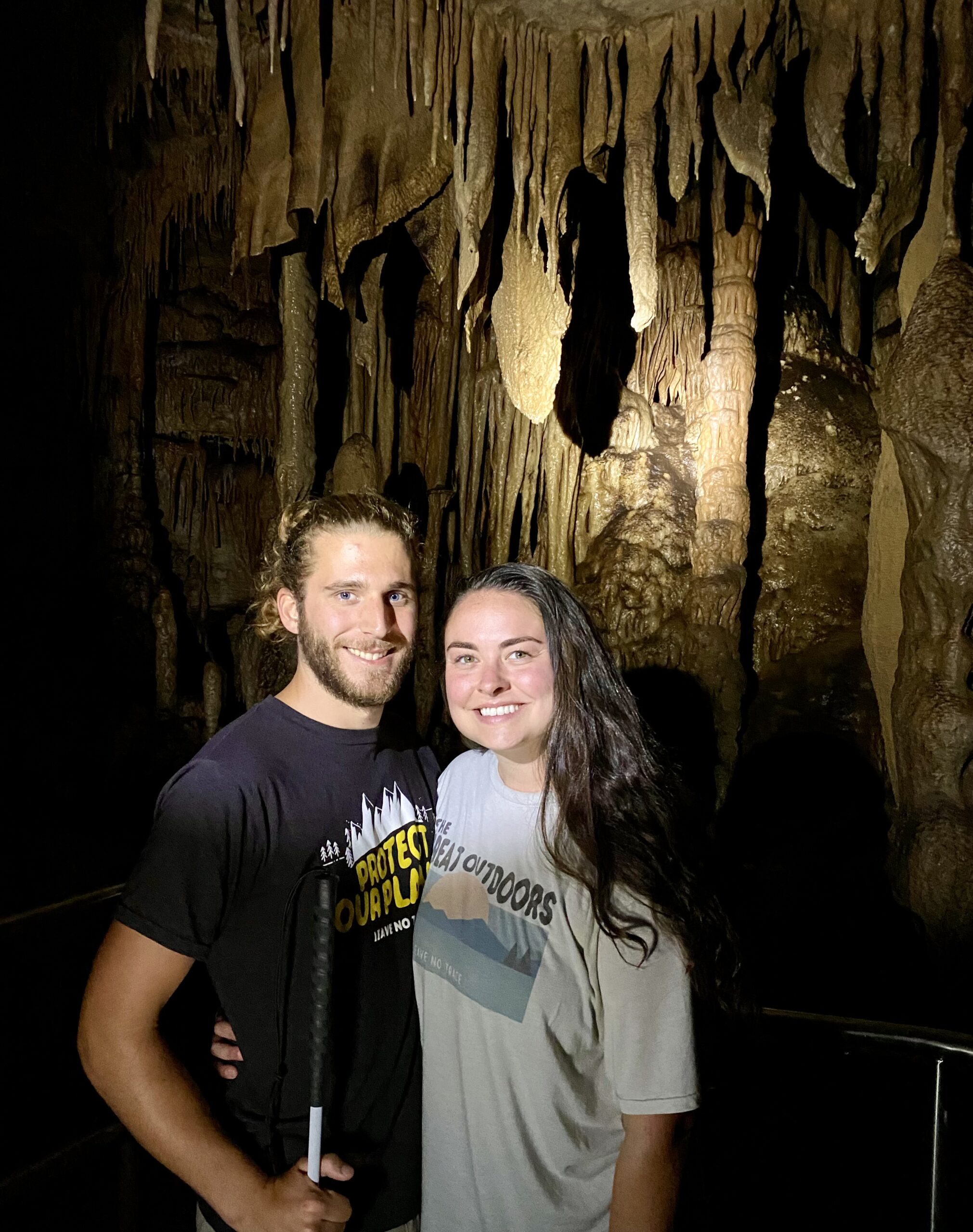
M: That acts as a great segue. You’re out in the field all the time now, in your capacity as a Subaru / Leave No Trace trainer. I’m honestly a bit jealous, so would you mind sharing that experience with us?
Luke: Yeah, it’s awesome. It’s my ideal lifestyle. The car becomes surprisingly familiar, and I love knowing where all of my stuff is.
It’s simpler in a lot of ways, but it’s also stretched and challenged me in really good ways – constantly being in new environments is a difficult thing with a visual impairment. Some days it is fun and effortless, and other days I am memorizing a college campus or festival grounds.
Overall, I’m becoming less high-strung about vision and memorizing pathways.
M: And what about the teaching side of your role, how has educating the public and working with land managers been?
Luke: I love teaching, especially when we are amongst land managers because we can get in-depth about inclusivity, respect, and teaching authority of the resource.
Kids? Kids scare me a little [laughs]. They’re so visual, so I can find them a little intimidating at times. This is where it’s nice to be a part of a team – Becca and I complement each other super well. She’s way better with kids, and she’s also great about letting me know if a kid has their hand raised and things like that. I’m growing!
So in that sense, I do love teaching kids. I’m using a cane most of the time while teaching, and it is important for kids to see someone with a disability – even if it can feel a bit awkward at times.
M: Since you’re living that Jack Kerouac life, what are some of the best little life hacks you’ve found? Any words of wisdom?
Luke: First off, grocery store sushi is the best meal on the road. It requires no preparation. Also, properly placing your shelves and coolers is really key. One little thing that’s been revolutionary has been adding a spice rack inside our cooler, keeping things from getting soaked.
Oh [laughs]. We also have our toothpaste jar, which might seem like the grossest thing we do. It’s our latest innovation – it can be so difficult to properly dispose of toothpaste when you’re living on the road. So we condensed it all into one jar. It’s, uh, something.
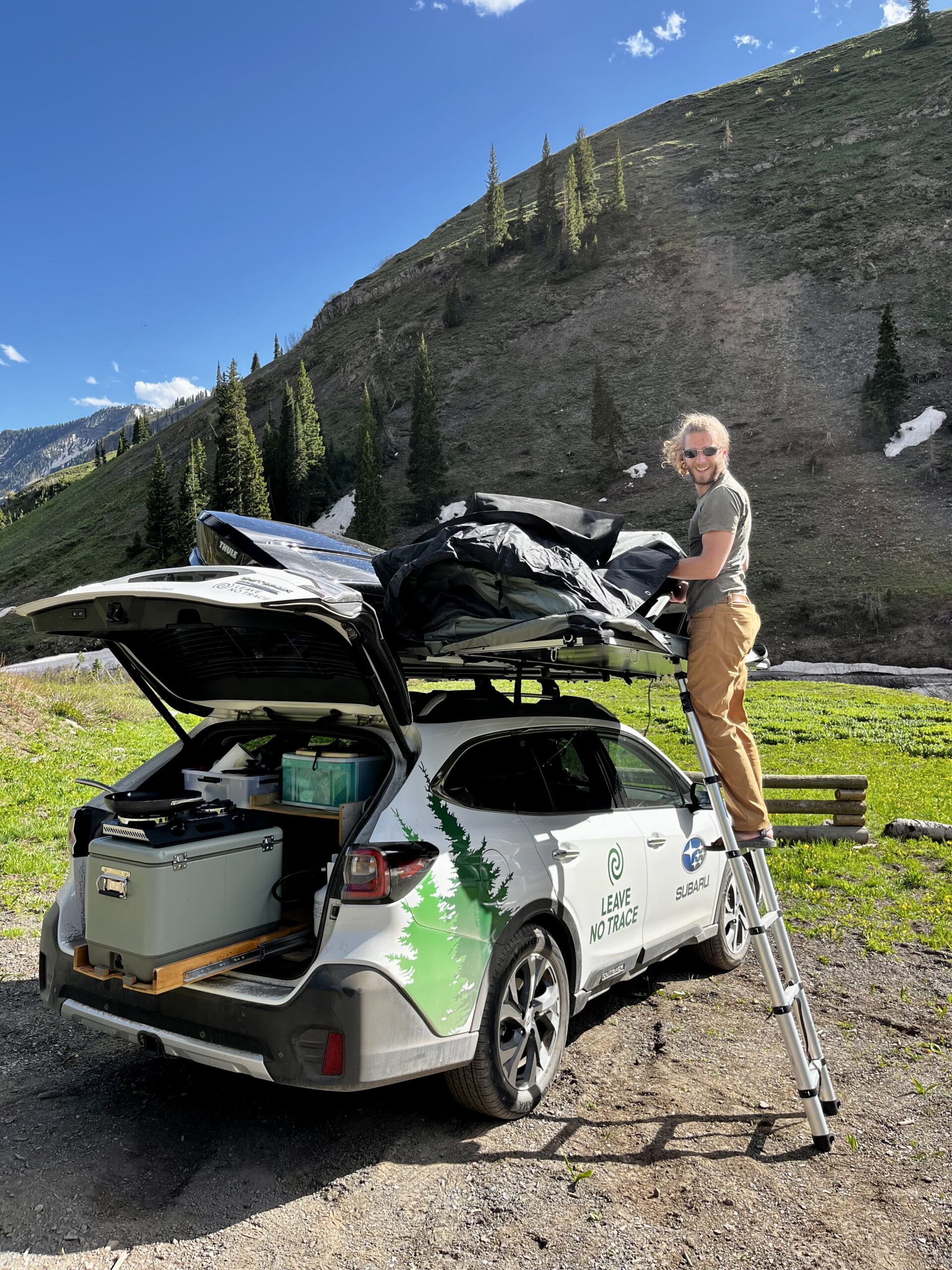
M: I’m doing my absolute best to not envision it, but kudos on the innovation! What is the actual best experience in nature you’ve had, you’d think?
Luke: The best couple of hours I’ve ever spent outside was in the Galapagos. We were with some new friends, hiking along an easy trail which I really appreciated.
But the forest! The forest was made up of palo santo trees, which smell like incense. They’re the wood many folks burn in religious ceremonies. So the whole forest smelled like incense, and there were these cacti with an interesting smell, and birds I’d never heard before.
And then we came out onto this beach. And there was this white white sand with the black volcanic rock and blue water. Contrast is very important to my limited sight.
M: So, for those reading this without a visual impairment, what is the best way we can all be better friends and stewards on the trail?
Luke: Just don’t be afraid to ask questions! What makes interactions with people on the trail awkward is when they won’t talk about my blindness. It is just another aspect of who I am – it is fine to talk about. I’ve spent a good amount of time in Latin America, where folks are very frank – I found it very refreshing, honestly.
In the States, I’ve had kids ask me a genuine question, and then the parent rebukes the kid for asking. I don’t like to see that type of thing, because then they feel generally uncomfortable about disabilities. That’s not how learning happens.
M: Last question is the same for everyone – if you had to boil down all of your life experiences to one sentence to share with the world, what would it be?
Luke: [laughs] It sounds super corny, but live and let live! It is great to not have people box me in. Different experiences for different people.

Let’s protect and enjoy our natural world together
Get the latest in Leave No Trace eNews in your inbox so you can stay informed and involved.
